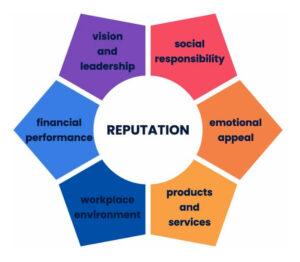Brand Reputation Management is the practice of monitoring, influencing, and improving how a brand is perceived by its audience, customers, and the public. It involves a set of strategies and tactics aimed at ensuring that the brand’s image is positive and that it maintains credibility, trustworthiness, and relevance in the market.

Key Aspects of Brand Reputation Management:
- Online Monitoring:
- Track mentions of the brand across digital platforms such as social media, review websites, forums, news outlets, and blogs.
- Use tools like Google Alerts, Social Mention, or reputation management platforms to stay on top of brand sentiment.
- Customer Feedback:
- Actively collect and analyze customer reviews, surveys, and feedback.
- Address complaints or negative feedback promptly, ensuring transparency and responsiveness.
- Public Relations (PR):
- Maintain a positive public image by managing media relations and controlling brand messaging.
- Handle crises with a strategic communications plan to minimize reputational damage.
- Content Creation:
- Develop valuable, authentic content that aligns with the brand’s core values and addresses customer concerns.
- Publish thought leadership articles, blog posts, and social media content that strengthens the brand’s credibility.
- Search Engine Reputation Management (SERM):
- Optimize content to ensure that positive content ranks higher in search engine results, while pushing down negative or irrelevant content.
- Crisis Management:
- Have a clear crisis communication plan in place for handling negative events, public relations disasters, or customer complaints.
- Address issues quickly and honestly to regain trust.
- Engagement on Social Media:
- Build a positive brand image by engaging directly with customers on platforms like Twitter, Instagram, and LinkedIn.
- Respond to customer inquiries, share brand stories, and showcase the brand’s values.
- Employee Advocacy:
- Encourage employees to act as brand ambassadors by fostering a positive internal culture.
- Happy employees are more likely to share positive experiences about the company publicly.
- Brand Consistency:
- Maintain a consistent voice and message across all communication channels, whether online or offline.
- This includes visual identity, messaging, and customer experience.
- Influencer and Partnership Strategy:
- Collaborate with influencers or strategic partners who align with the brand’s values and can amplify positive sentiment.
- Make sure any partnerships are in line with your brand’s image to avoid potential reputation risks.
Steps to Improve and Maintain a Strong Brand Reputation:
- Set Clear Expectations:
- Establish the brand’s core values and ensure they are communicated consistently across all touchpoints.
- Monitor Regularly:
- Continuously track what’s being said about your brand across various channels and adjust strategies accordingly.
- Respond to Criticism:
- Don’t ignore negative reviews or complaints. Engage with criticism in a constructive way, offering solutions and acknowledging concerns.
- Proactive Engagement:
- Build and nurture relationships with loyal customers and fans. Engage them in meaningful ways, turning them into brand advocates.
- Measure Performance:
- Use analytics tools to measure the impact of reputation management efforts, such as sentiment analysis, brand awareness, and customer loyalty metrics.
- Transparency and Authenticity:
- Be open about mistakes or shortcomings and show how you’re addressing them. Authenticity is key in building trust.
Benefits of Effective Brand Reputation Management:
- Increased Customer Trust: A strong reputation leads to more loyal customers who trust your brand and products.
- Competitive Advantage: Brands with a positive reputation tend to outperform their competitors, as consumers are more likely to choose them over others.
- Crisis Resilience: Brands that have actively managed their reputation are better equipped to withstand crises and damage control.
- Higher Revenue: Positive brand perception often leads to more sales, as consumers are more willing to purchase from reputable brands.
- Long-Term Success: Effective brand reputation management contributes to sustained growth, fostering customer retention and attracting new audiences.
In today’s digital age, reputation is everything. Brands that manage their reputation well are often more successful, while those that neglect it may face long-term challenges.